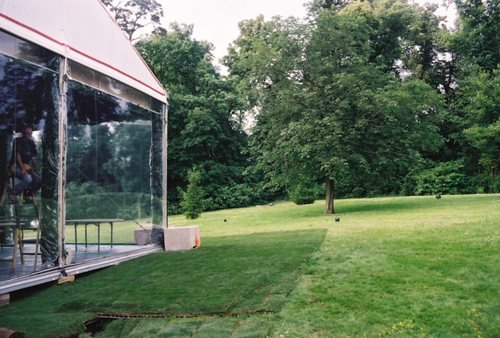Andreas Fogarasi
dal 15/5/2008 al 28/6/2008
Segnalato da
15/5/2008
Andreas Fogarasi
Ernst Museum, Budapest
The exhibition, entitled Informacio, presents an extensive overview of the artist's work from the past years, alongside the "Kultur und Freizeit" project. The complex examination of a chosen structure (in architecture/design/history of culture) and its system of symbols usually become the subject of interpretation through the design of the space and the objects of the installation.

Ernst Museum Budapest is pleased to present the solo show of Andreas Fogarasi.
In 2007, the Hungarian Pavilion of the 52nd Venice Biennial won the Golden Lion Award for Andreas Fogarasi’s project entitled Kultur und Freizeit (Culture and Leisure). The project, curated by Katalin Timár, deals with a phenomenon that currently affects all of Europe: the present situation of cultural centres, which have provided an ever-changing setting for popular culture, and which were once formed along the lines of specific culture-political decisions and ideas. More than anything, the six films – which have not been shot with an expressly documentary approach – raise questions about the current condition of the clubs, cultural centres and community establishments with their colourful past, on the one hand, and regarding their “new” identity and status as well as the possibilities for their functioning in a changing political, economical and cultural space, on the other.
The slow moving images of the videos projected in the “black boxes”, which function both as mini cinemas and sculptural object, show from an emphatically subjective perspective details of the repeatedly altered and rebuilt spaces and their urban environments as well as the state of community centres which have served – and still serve – as social sites for different small communities, professional exchanges, local cultures and various events.
A number of Fogarasi’s works address the question of cultural identification – including the issue of branding – and the visual changes that manifest in its appearance (Public Brands – The Nine States of Austria, 2003; Westen [aka Osten], 2005). Research on typography, communication design, history of architecture and industrial design have always comprised an organic part of his projects. The complex examination of a chosen structure (in architecture/design/history of culture) and its system of symbols usually become the subject of interpretation through the design of the space and the objects of the installation.
The solo exhibition, entitled "Információ", presents for the first time in Hungary an extensive overview of the artist's work from the past 7-8 years, alongside the "Kultur und Freizeit" project.
Andreas Fogarasi studied architecture at the University of Applied Arts in Vienna. Between 1997 and 1999 he was a collaborative organiser and student of the Freie Klasse (Free Class). He completed his studies in 2003 at the Academy of Fine Arts in Vienna. Since 2001, he has been co-editor of dérive – Magazine for Urban Studies. http://www.derive.at
Image: Parc du Trianon, 2002
Supporters: Ministry of Education and Culture, Bundesministerium für Unterricht, Kunst und Kultur
Österreichisches Kulturforum Budapest
Media supporter: Art-magazin
For further information please contact: Reka Csejdy at rcsejdy@mucsarnok.hu
Opening: Friday, 16 May 2008, 6 p.m.
Opening speech by: Miklós Erhardt, artist
Ernst Museum
Nagymezo u. 8. H-1065 Budapest



